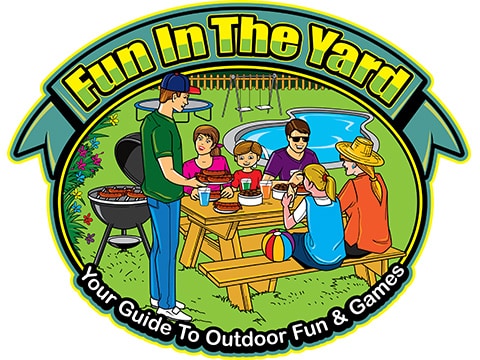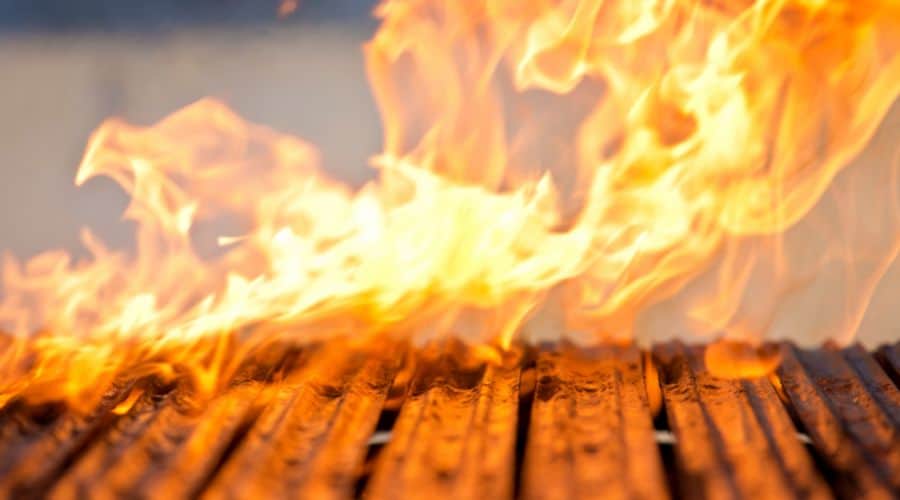Roughly 10,600 grill fires are reported annually, and 46% include structures where the grill was too close to a wall, overhang, or roof. Being cautious with your outdoor grill is essential. After all, no one wants to become a statistic or pay for expensive repairs.
What is the main reason grills catch on fire? Read on, and I’ll teach you about grill fire causes and how to avoid them to stay safe.
The main reason why grills catch on fire is due to grease accumulation from cooking. Unfortunately, improper or infrequent cleaning can lead to buildup, leaving deposits of flammable fat available as fuel for a fire. Like a flareup when grease from meat drips on coals or gas burners, this fat can heat up enough to vaporize and burn.
Table of Contents
What Causes A Grill To Catch On Fire
Grills catch fire for a number of reasons. Although grease is the most common culprit, it’s not the only one.
Below I will explain how and why each type of fire starts, how to put it out, any fixes you may need, and whether the grill is safe to use afterward.
Propane Grill Fire Causes
Propane grills are the most likely to have a fire partially because these are the most complex grills. More parts mean more potential problem areas.
Please note that if you have a natural gas grill, all the same fire causes and solutions apply.
- Grease Buildup – A grease fire happens when the grease gets hot enough to burn. Unlike a flareup, a grease fire is large and dangerous. Smother it with sand, salt, or baking soda. Never use water as it will spread the fire. You can use the grill once it has cooled and been cleaned off thoroughly unless there’s damage.
- Insects In Burner Tubes – Small insects can get into your burner tubes unnoticed. Regular inspection and cleaning are your best defense, but if you have a fire, it will happen when the pressure behind the bugs builds up, and eventually, the propane explodes outward. If your grill won’t light, turn it off and inspect the line and burner tubes. Use a fire extinguisher on this type of fire. You can use the grill after it’s cooled and cleaned.
- Gas Leak – As Worst Case Wednesday explains:
- If you can safely reach the knobs, turn off the burners on a gas or propane grill. If a propane tank itself is involved in the fire, evacuate the vicinity and call emergency services immediately.
- Smother the fire. Never spray water onto a grease fire. It will intensify the flames and spread the burning grease to a wider area. Throw salt, baking soda, or sand onto the fire to smother the flames.
- Close the lid. Make sure all grill vents are closed to further starve the fire of oxygen.
- If the fire is still burning after 30 seconds, douse the grill with a fire extinguisher.
- Delayed Ignition – Never start a gas grill with the lid closed. Gas can build up inside, causing a fireball, and it’s worse with delayed ignition. If you have a known ignition problem, replace the starter or use a fire lighter or long match to start one burner at a time. In case of fire, use an extinguisher. Cool and clean before using the grill again.
Flashback Fire Danger: Flashback fires happen when the fire blows outward, often around the knobs that control your burners. This can cause damage to the knobs and make it so you can’t safely turn off the burners at the grill. Instead, cut the propane tank off. Then take your grill in for a professional assessment and knob replacement before attempting to use it again.
Why Did My Pellet Grill Catch On Fire
Pellet grills are technically on fire all the time because you are burning wood for the heat and smoke.
However, you should not experience large flames. If you do, the grill is not ‘grilling or smoking,’ it’s on fire.
Fortunately, this is easily avoided, and this grill style has only a couple of common causes of fires.
- Too Many Pellets – Overfilling your pellet grill can cause a fire. Ensure you follow the manufacturer’s directions and use appropriate pelletized fuel only. In case of a fire, you can put out pellets with water or an extinguisher. It’s usually safe to use this grill once it’s cooled and cleaned.
- Overful Grease Tray – An overfull grease tray can cause a large pellet fire. Treat this like any grease fire and smother it rather than using water or a fire extinguisher. Once cool, clean every part, especially the grease tray, and you can use the grill again if it’s undamaged.
Electric Grill Caught On Fire
Like pellet grills, there are only two leading causes of fires. However, unlike the other types of grills on this list, an electric grill should never have any real fire in or on it.
The coils inside heat up, but even flareups are abnormal with this style of outdoor cooking.
- Grease – I’ve covered grease buildup before. However, with an electric grill, you need to immediately smother the fire and turn off the machine, unplugging it as necessary. You can use it again once cool and clean.
- Electrical Fire – If you have an electrical fire, it will most likely be in the cord, but regardless, unplug immediately. Smother the flames with baking soda or use a fire extinguisher and replace the grill.
Why Does The Bottom Of My Grill Catch On Fire
Most grills that have fires in the bottom are coal-fired. Typically it has to do with a buildup of something flammable in the bottom.
I’ll explain what, why, and how to deal with it below.
- Fat Dripping and Grease Buildup – A fire in the bottom of your grill from fat or grease is the same as any grease fire. Smother it and cool the grill off. Once it’s clean, you can reuse an undamaged grill.
- Debris – Flammable debris like leaves or party napkins can sometimes go unnoticed at the grill’s bottom. Often these will burn off in a few seconds, and you don’t need to intervene, though they may adversely affect your cooking. If you notice any debris, clean it out before putting coals in. In case of a large fire, use water or a fire extinguisher if it’s safe to approach, then cool and clean the grill before using it again.
Lighter Fluid Fires In Coal Grills: Do not use lighter fluid or other liquid starters in a coal grill as it can cause massive fireballs. They may be fun to watch, but you can get hurt badly. Instead, opt for self-starting coals.
Helpful Tips To Know About Why Did My Grill Catch On Fire
Most of the time, you can safely continue to operate a grill after a fire has occurred.
However, cleaning up thoroughly is essential, so you’ll have to wait for it to cool and grill later or another day.
Here are a few more helpful tips to know about why did my grill catch fire.
- According to NFPA, the National Fire Prevention Association, “Five of every six grills involved in home fires were fueled by gas (84 percent), while 12 percent used charcoal or another solid fuel. Gas grills were involved in an average of 8,900 home fires per year. Leaks or breaks were primarily a problem with gas grills.”
- The most important thing to prevent grill fires is to clean your grill out completely after every use. Get a high-quality, metal-friendly degreaser to help remove any deposits. Wipe down all the surfaces, and then remove any remaining degreaser to prevent it from burning and ruining your next outdoor meal.
- Always wait until your grill is thoroughly cooled off before you clean it. Dispose of debris like burnt food or ashes in the garbage once you’ve ensured they are completely cool. Hot ash can melt garbage bags and start new fires.
- Never burn trash, paper, or other items in a grill. Using only the recommended fuel sources is essential to avoid fires and dangerous smoke pollution that can make you and your guests sick.
Final Thoughts
Grill fires can be thrilling or frightening, but the most important thing to know is that they are not a normal part of grill operation.
A few flareups as meats drip onto flames, coals or pellets are normal, but you should never have a significant fire in your grill.
Always clean and maintain your grill correctly and give it a quick but thorough inspection before you use it.
Keep your fire prevention equipment on hand, whether it’s a bucket of sand, fire extinguisher, or other option.
If you suspect a problem, stop immediately, and remember never to assume it can’t happen to you.

